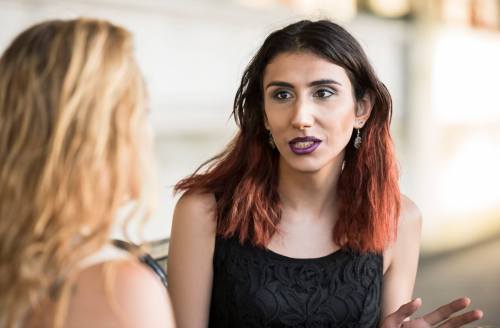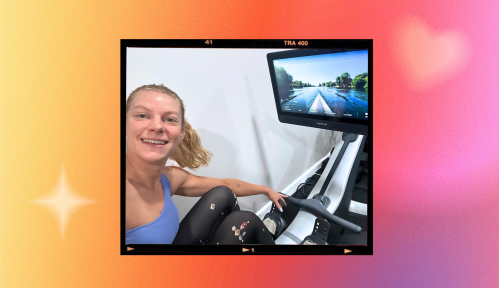Our editors independently select these products. Making a purchase through our links may earn Well+Good a commission
Despite all the strides we’ve made in taking the stigma out of mental health issues, finding your dream therapist is still about as hard as twisting into a yoga-shaped pretzel or running a marathon. And for LGBTQ+ folks, who have an increased risk of depression, attempted suicide, PTSD, and addiction, the hurdle of finding a therapist can be particularly overwhelming.
“The truth is that not all therapists are LGBTQ+ allies,” says Rena McDaniel, licensed clinical counselor and sex therapist based in Chicago. While it’s a therapist’s job to be completely non-partial and address topics head-on… “historically, the mental health and health field has been a huge place of discrimination for queer folks. And, sadly, that’s still the case,” says McDaniel.
From conversion therapy to electroshock therapy, many LGBTQ+ people have been forced to undergo psychological “treatments” designed to “cure” them of their sexuality. In the United States alone, an estimated 698,000 adults have received conversion therapy, despite the fact that the underlying science behind the practice has been largely debunked and has been associated with reports of increased depression, suicidality, and “self-hatred.”
As a queer, white, cis-gender woman with an affordable health-care plan, I admit that I have an incredible amount of privilege. But still, I’ve had a hard time finding a therapist who *doesn’t* come into the sessions with internalized biases about my queerness and bisexuality. (Like, assuming I was heartbroken about splitting with my boyfriend only because he was the first guy I’d ever dated, not because, you know, I legit cared about him and our relationship.)
Being a therapist who is an LGBTQ+ ally goes beyond having a gay brother and/or being in favor of gay marriage. It’s about being trained specifically in how to work with us, and being competent enough to understand the specific mental health issues that LGBTQ+ folks face.
So, how do you find a therapist who is definitively and absolutely an LGBTQ+ ally and can give you the kind of support you need and deserve? There are various online resources out there for queer folks seeking a therapist, which can be helpful.
Scroll down for your complete guide to finding an LGBTQ+ friendly therapist that’s right for your needs.

First, do your research
Sadly, you can’t just wish a great therapist into existence—you’re going to have to make time to do some homework.
As with anyone looking for a therapist, you should first determine the type that fits your needs. Do you want a psychiatrist because you think you might need a prescription medication for your depression? Or are you simply looking for someone to talk to (and thus, might only want a counselor or a social worker)? Figure that out.
Once you know the type of specialist you want, you can find a match that’s truly LGBTQ+ friendly by using any of the following expert-backed resources:
American Society Of Sex Educations, Counselors, and Therapists (ASECT)
“All therapists who belong to this group have received at least one major training module specifically on the LGBTQ+ population,” says McDaniel. “Experts with this certification are known to be more affirming, sex-positive, and understanding of an array of types of human sexual behaviors.” (Translation: They’re better qualified to meet your needs—and more likely to be open-minded and accepting.) You can find an ASECT certified professional by country, state, and speciality by searching their database.
National coalition for sexual freedom
“The NCSF is a national grassroots-based nonprofit organization that basically works to protect the rights of consenting adults who practice alternative (read: not heterosexual) forms of relationships and sexual expression,” explains Liz Powell, PsyD, an LGBTQ-friendly sex educator. “They have a directory of Kink Aware Professionals that’s a great place to start for therapists who are open to a diverse range of sexualities and sexual lifestyles.”
World Professional Association For Transgender Health (WPATH)
“WPATH has a list of people who are WPATH-certified which is about trans and gender nonconforming folks,” says McDaniel. Its members follow a specific set of ethical guidelines and standards of care in order to “promote health, research, education, respect, dignity, and equality for transsexual, transgender, and gender nonconforming people in all cultural settings.” Search their directory here.
RAD Remedy is a nonprofit organization whose mission is to connect trans, gender non-conforming, intersex, and queer folks to accurate, safe, respectful health options. “They have a lot of different LGBT-affirming providers of all types, including therapists,” says McDaniel. Enter “therapist” or “individual therapy” into the Find section when you search, and type your city or zip code into the Near section. This combo will bring up therapists near you.
Gay and Lesbian Medical Association (GLMA)
The GLMA has a provider directory where LGBTQ+ folks can search for primary care providers, specialists, therapists, dentists and other health professionals in their area. In order to be listed in the directory, providers must affirm their agreement with statements like, “I believe that lesbian, gay, bisexual and transgender identities are within the spectrum of normal human experience and are not in themselves pathological, “unnatural,” or sinful. I therefore do not promote or support attempts to change patients’ sexual orientation or gender identity.”
Your city’s LGBTQ+ resource center
“LGBTQ+ centers in cities will also usually have a list of providers in the area, and in some places there are dedicated organizations for providers who specialize in work with sexual and gender minorities,” says Dr. Powell. Most of the lists they have available are for healthcare providers in general who ID as LGBTQ+ allies, as opposed to just therapists, so it may take a little hunting.
Psychology Today is a reputable source that’s easily searchable thanks to filters that allow you to narrow your search by gender, race/ethnicity, specific problems, treatment modalities, and yes, whether or not they’re an LGBTQ+ ally. “Searching for a therapist on Psychology today is like digging through a thrift store, but it’s easy to use and a great place to start,” says McDaniel. Just FYI: the system relies on people identifying themselves as allies, rather than being independently vetted. “So it may bring up some therapists who don’t routinely work with queer folks. But at the very least, you won’t get pull up any bigots, ” says McDaniel.
“Planned Parenthood is known for fighting for sexual healthcare for all,” says professor and gender diversity advocate Lee Airton, PhD, author of Gender: Your Guide. They offer resources, service referrals, and support groups for LGBTQ+ folks. “So even if they don’t have a therapist in office, they’ll probably have a list of referrals for you,” Airton says.
Ask your queer and trans* friends for recommendations
“Leverage your queer friends,” says Dr. Airton. “Word of mouth is a powerful tool because these are proven allies.”
The Trevor Projectand the Trans Lifeline
If you or a friend are having a mental health crisis, you can reach The Trevor Project hotline (which is specifically for LGBTQ+ people) 24/7 at 866-488-7386. They also have a texting service, which you can access by texting “TREVOR” to 202-304-1200, and an online counseling system.
The Trans Lifeline, which is run by transgender operators, is another valuable line for folks living in the United States (at 877-565-8860) and Canada (at 877-330-6366).

Next step: give them a call
Okay, so you’ve found someone you think could be a great fit for you and your mental health needs. But before booking an appointment, ask the person a few questions over the phone to determine if they’re actually right for you.
“In this day and age, it’s really tough to get a human on the phone to ask questions. So you can also use email, but remember that tone on the phone is a good indication of therapy style,” says Dr. Powell.
“Be really direct about your needs,” says McDaniel. “Tell them how you identify, and ask if they have ever worked with other people who identify like you.” You can also ask about what certifications they have to help them address your specific needs.
In states where conversion therapy is still legal, you may want to ask, “Do you provide conversion therapy or reparative therapy?” If they say no, you may want to push further and ask how they feel about this particular kind of therapy to ensure you’re getting someone who does not advocate for this kind of treatment.
Beyond these, ask the questions that matter most to you. Then, using these answers, the info you’ve gleaned from their online professional presence (LinkedIn, Yelp reviews, personal website, etc), and your gut, decide whether or not to book an appointment. “If you make an appointment, make sure that your correct name and preferred pronouns are listed in your patient folder,” advises McDaniel.
Granted, even the best research in the world doesn’t guarantee an instantly-perfect match. Think about it this way: You wouldn’t dive head-on into a relationship with someone just because they responded to your PERSONALS ad, or you matched with them on Tinder. Believe in the process and keep the search for your dream therapist going, because getting help might just save your life.
These 10 thoughts everyone has during a therapy session is relatable AF. And if you’re unsure about whether or not to come out at work, this 5-step guide may help.
Sign Up for Our Daily Newsletter
Get all the latest in wellness, trends, food, fitness, beauty, and more delivered right to your inbox.
Got it, you've been added to our email list.











